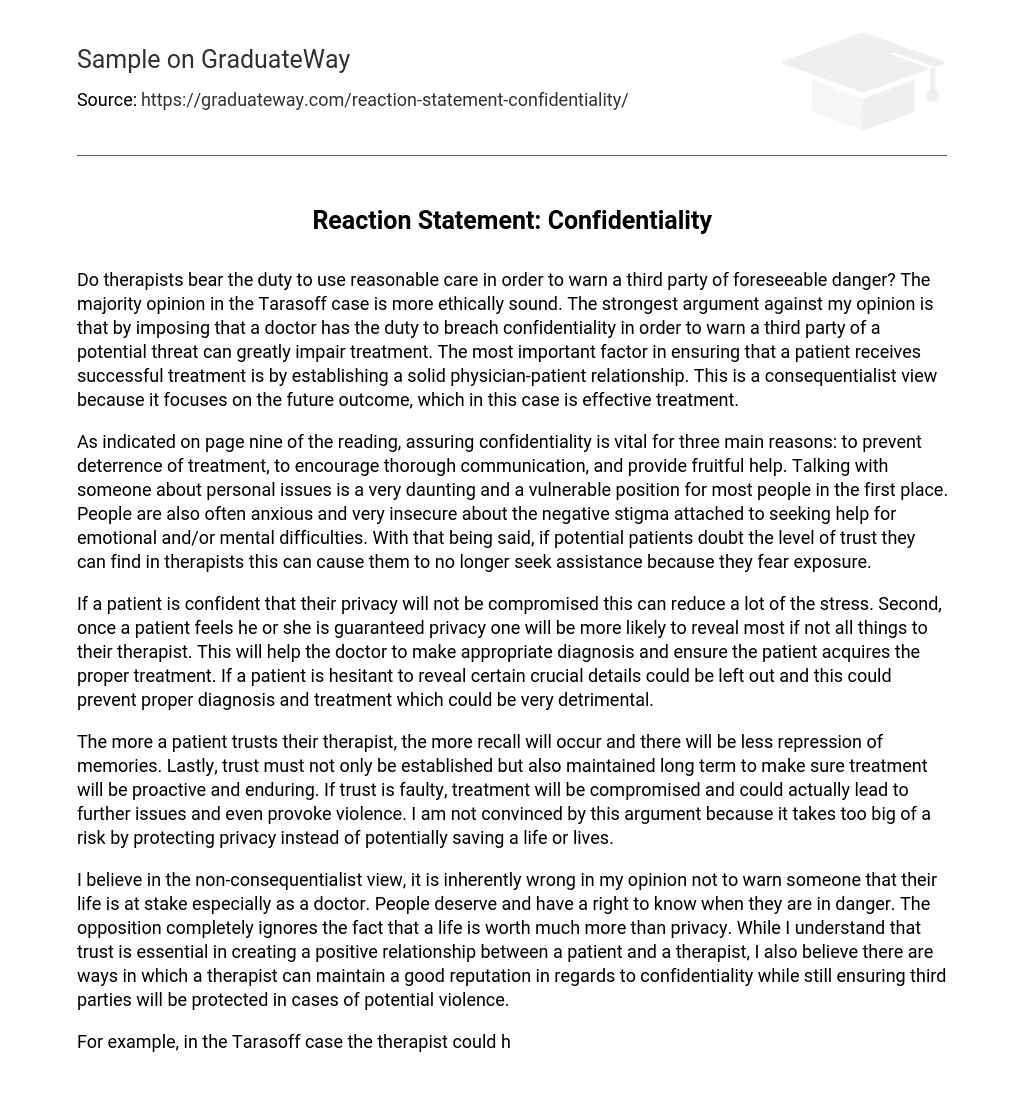Do therapists bear the duty to use reasonable care in order to warn a third party of foreseeable danger? The majority opinion in the Tarasoff case is more ethically sound. The strongest argument against my opinion is that by imposing that a doctor has the duty to breach confidentiality in order to warn a third party of a potential threat can greatly impair treatment. The most important factor in ensuring that a patient receives successful treatment is by establishing a solid physician-patient relationship. This is a consequentialist view because it focuses on the future outcome, which in this case is effective treatment.
As indicated on page nine of the reading, assuring confidentiality is vital for three main reasons: to prevent deterrence of treatment, to encourage thorough communication, and provide fruitful help. Talking with someone about personal issues is a very daunting and a vulnerable position for most people in the first place. People are also often anxious and very insecure about the negative stigma attached to seeking help for emotional and/or mental difficulties. With that being said, if potential patients doubt the level of trust they can find in therapists this can cause them to no longer seek assistance because they fear exposure.
If a patient is confident that their privacy will not be compromised this can reduce a lot of the stress. Second, once a patient feels he or she is guaranteed privacy one will be more likely to reveal most if not all things to their therapist. This will help the doctor to make appropriate diagnosis and ensure the patient acquires the proper treatment. If a patient is hesitant to reveal certain crucial details could be left out and this could prevent proper diagnosis and treatment which could be very detrimental.
The more a patient trusts their therapist, the more recall will occur and there will be less repression of memories. Lastly, trust must not only be established but also maintained long term to make sure treatment will be proactive and enduring. If trust is faulty, treatment will be compromised and could actually lead to further issues and even provoke violence. I am not convinced by this argument because it takes too big of a risk by protecting privacy instead of potentially saving a life or lives.
I believe in the non-consequentialist view, it is inherently wrong in my opinion not to warn someone that their life is at stake especially as a doctor. People deserve and have a right to know when they are in danger. The opposition completely ignores the fact that a life is worth much more than privacy. While I understand that trust is essential in creating a positive relationship between a patient and a therapist, I also believe there are ways in which a therapist can maintain a good reputation in regards to confidentiality while still ensuring third parties will be protected in cases of potential violence.
For example, in the Tarasoff case the therapist could have warned Tatiana of danger and instructed her not to say anything to Poddar that would suggest she knows. Then the police could simply be in surveillance of Poddar. This way Tatiana would be alert and possibly able to defend herself and law enforcement may be able to stop the act because they would know Poddar was stalking Tatiana and could intervene. In this scenario Poddar would have no knowledge that his therapist was ever involved and it would be as though he simply got caught.
As mentioned on page five, it is difficult for a therapist to predict violence, but I think the threat itself is enough to cause alarm and should be taken seriously regardless. To look at this from another perspective, if a patient is HIV positive and tells his or her doctor that they will not inform their partner and continue to have sex with them, it is completely irrelevant whether or not the doctor can decipher how serious the patient.
It is equally possible that the patient could be simply saying that out of frustration and resentment or they may be dead serious. What matters is that a person is now potentially in harm’s way and it is completely unethical and morally wrong for the doctor to keep such a putrid secret. Overall my outlook is better safe than sorry; it may seem logical under the law to protect privacy but in cases of violence or harm it is certainly not ethical.





